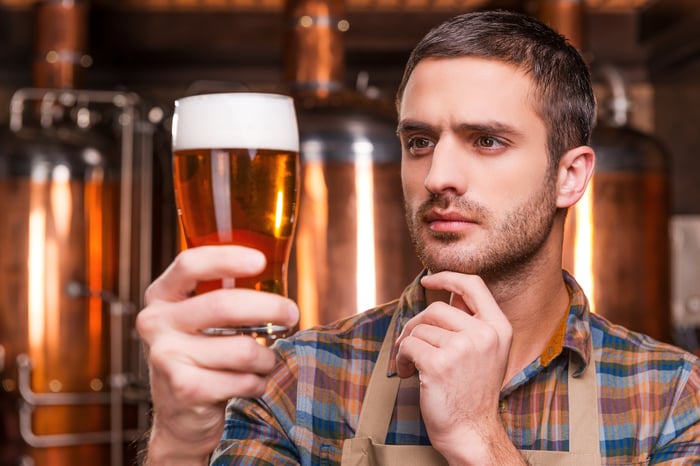The marijuana industry has put on a show for pot enthusiasts and investors this year. The highlight, as you can imagine, was the legalization of recreational cannabis on Oct. 17 in Canada. In a few years, after the industry has had time to expand its capacity and lay the foundation for its sales channels, $5 billion or more in added annual sales may be possible.
But for as impressive as the cannabis industry has been so far, all eyes are now turning to what 2019 might hold for pot stocks. While it's impossible to tell what'll happen with any certainty, investors will likely be waiting on the edge of their seats for one beverage giant to choose a cannabis partner.

Image source: Getty Images.
Is 2019 the year this $88 billion beverage giant finds its weed partner?
For those who may not recall, August 2018 kicked off a monster rally in marijuana stocks. That was because two major beverage companies announced partnerships or investments with pot stocks in an effort to develop cannabis-infused beverages (and possibly other products).
It began on Aug. 1 when Molson Coors Brewing (TAP 0.38%) announced that it had formed a 57.5%-42.5% joint venture with Quebec-based grower HEXO. This was the first sizable partnership geared toward cannabis-infused beverage production. Mind you, Molson Coors and HEXO were looking quite a bit into the future when they made this deal. That's because only dried cannabis and oils are permitted for sale at the moment. Alternative cannabis products such as vapes, edibles, concentrates, and infused beverages will need to be reviewed and approved for consumption by Parliament. This is expected to happen by next summer.
Two weeks later, on Aug. 15, Constellation Brands (STZ 0.09%) announced what would be the biggest deal in marijuana history with Canopy Growth (CGC -5.04%). By purchasing 104.5 million shares of Canopy's common stock, Constellation, the maker of the Corona and Modelo beer brands, lifted its stake in the company to 37%. It also lined Canopy's coffers with $4 billion in cash that it can use for acquisitions, capacity expansion, and improving its international sales channels. Constellation and Canopy are fully expected to work on infused beverages when they become legal, but with a 37% equity stake, it's pretty evident that Constellation has far greater ambitions for industry growth.

Image source: Getty Images.
Just over a week later, rumors began to swirl about spirit and beer giant Diageo (DEO -1.84%), which is probably best known for its Captain Morgan, Smirnoff, Johnnie Walker, and Guinness brands. Following initial reports from Bloomberg that Diageo was in active discussions with three unnamed marijuana companies, no deal was ever reached. However, that could all change next year.
Diageo may rightly be waiting to see how well (or poorly) growers respond to strong consumer demand for product in the early going. Additionally, since no alternative products beyond oils can be legally sold for the time being, the company may also prefer a wait-and-see approach until midyear, when it would be clearer if Parliament will indeed expand cannabis consumption options to include cannabis-infused beverages.
Diageo, which only reports its operating results every six months, announced in July that its fiscal 2018 net sales rose by a meager 0.9%. Although it generated considerably stronger profit growth, Diageo is looking for a top-line spark. Presumably, cannabis-infused beverages could be that answer.
Which pot stocks could be on Diageo's radar?
Assuming Diageo does indeed strike a partnership with a marijuana grower in 2019, the question then turns to which pot stock could be the prime beneficiary of such a deal. Keeping in mind that this is pure speculation on my part, these following three growers would make sense.

Image source: Getty Images.
The first solid fit would be Aphria (APHA), which is already devoting 10% of its peak production to an extraction facility for cannabis concentrates. Aphria's management team has made a concerted effort to diversify the company's product line away from a reliance on dried cannabis, and a partnership with Diageo would further that strategy. Aphria is also on track to be the third-largest grower by peak production at an estimated 255,000 kilograms per year. With access to a dozen markets and an existing run rate of 35,000 kilograms a year, Aphria would appear to have a good shot at landing a partnership with Diageo.
A second candidate, which is a bit of a dark horse, is The Green Organic Dutchman. The Green Organic Dutchman, based on management's own peak production forecast of 195,000 kilograms, could be the nation's fourth- or fifth-largest producer. It's also devoting just over 20% of this production to edibles and infused beverages, which would seem to be a seamless invite to a larger player like Diageo. The downside is that The Green Organic Dutchman won't even recognize its first sale until the first half of next year and is therefore trailing its peers in production ramp-up.
Third and finally, Aurora Cannabis might be an option. Following its acquisition of ICC Labs in South America, Aurora is on track to produce an author-estimated 700,000 kilograms at peak capacity, if not more. As of November 2018, it already had an annual run rate of 70,000 kilograms of cannabis. Its access to 18 markets and output potential alone make Aurora Cannabis a viable candidate.
Only time will tell if Diageo takes the next step; but if it does, it'll potentially be the deal of the year.



